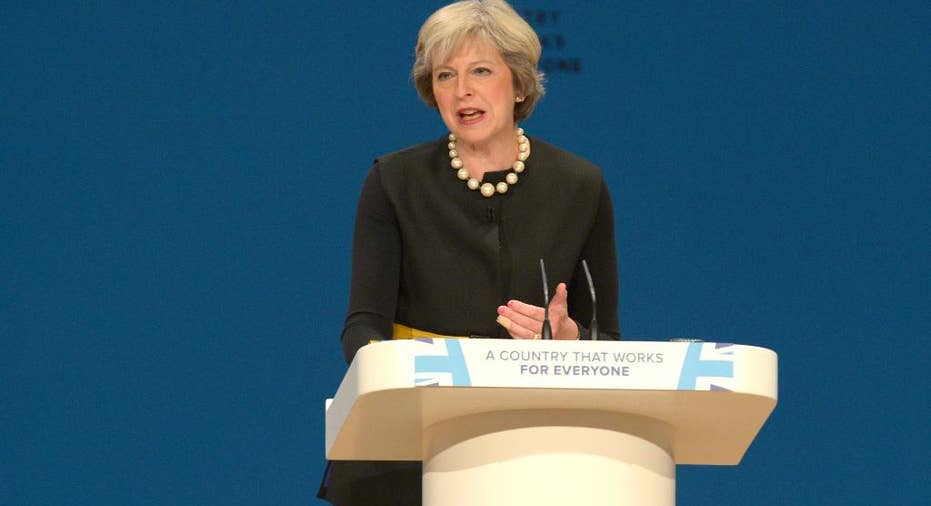Turbulence ahead: UK Tories battle over soft or hard EU exit

BIRMINGHAM, England – In June, British voters decided to leave the European Union — without agreeing exactly where they were going, or how fast.
This week Prime Minister Theresa May clarified the timeframe, saying she will trigger two years of formal exit talks before April. But members of her governing Conservative Party are wrestling over control of the steering wheel that will take Britain toward either a looser but still intertwined relationship with the bloc, or a dramatic "hard Brexit" with unknown consequences.
At the annual Conservative conference in England's second city of Birmingham, those who want a quick and dramatic separation think they have the upper hand.
"We believe that we can have a clean, prompt and effective Brexit," said property developer Richard Tice, a founder of the pressure group Leave Means Leave. "And increasingly it appears that the prime minister believes that as well."
Hard-core Brexiteers like Tice believe regaining control — over financial rules, business regulations and especially over immigration — is more important than remaining in the EU's single market or customs union. The EU insists Britain cannot choose to benefit from access to the single market without also keeping open its borders to EU citizens.
May used to advocate staying in the EU, but in a tough-sounding conference speech Sunday, she said the U.K. would become "a fully independent, sovereign country" with "the freedom to make our own decisions on a whole host of different matters, from how we label our food to the way in which we choose to control immigration."
That was music to the ears of Conservative euroskeptics, who find themselves in the ascendant after years of being marginalized under former Prime Minister David Cameron. May, who took office in July amid a post-referendum shakeup in British politics, has given several top jobs to anti-EU politicians, including Trade Secretary Liam Fox, Brexit Secretary David Davis and Foreign Secretary Boris Johnson.
The post-referendum turmoil and uncertainty gave the four-day Conservative conference, which ends Wednesday, an atmosphere of mixed confidence and jitters.
The gift shop sold T-shirts with the slogan "the lady's not for turning" — a catchphrase of late Prime Minister Margaret Thatcher now deployed to convey May's resoluteness.
At packed panel sessions on what Brexit might mean for the financial services sector, the wider economy and Britain's relationship with the world, "leave" supporters were buoyant. They said the British economy has defied gloomy pre-referendum predictions. Unemployment and inflation remain low, and the key services sector has continued to grow.
Even the plunge in the pound, which has lost about 15 percent of its value against the dollar since the June 23 vote and hit a 31-year low below $1.28 on Tuesday, can be painted as a plus because it's a boon for exporters.
Ebullient pro-Brexit lawmaker Anne-Marie Trevelyan told a conference gathering that she had "110 percent confidence" the economy will thrive outside the EU.
"We have the right time zone, we have the right language and we have the right place on the map," she said.
John Redwood, a veteran euroskeptic member of Parliament, said negotiating a new trade deal with the EU would be straightforward.
He said Britain could offer the EU "a very simple, friendly choice: We can either carry on, tariff-free, within the current arrangements" — or Britain leaves the single market and trades with Europe under the terms of the World Trade Organization, which would imply tariffs.
"I don't think our trade will be damaged with the rest of the EU," Redwood said.
While "leave" supporters at the conference expressed their confidence in broad brushstrokes, pro-EU Conservatives worried about details. They say there is a mind-boggling amount of detail involved in extricating Britain from a 40-year relationship and a dense network of laws and regulations.
Will British exporters retain tariff-free trade with the EU? Will the City of London financial sector keep the right to do business across the bloc without barriers? No one knows. May says that the government will not reveal its negotiating hand or give a "blow by blow account" of talks with the EU once they start.
Emma Nicholson, a Conservative member of the House of Lords, said the referendum result had "put an earthquake" under Britain's financial sector — and she warned there could be "a potential tsunami after this if things don't go the best possible way."
Pro-EU lawmaker Anna Soubry worried that the emphasis on controlling immigration — a key issue for many "leave" voters — would shut down the possibility of Britain remaining in the European single market.
"The great danger is that we don't get as good a deal on trade because we obsess about controlling immigration," Soubry said.
Pro-EU Tories are feeling glum, but they cling to the hope that the tough talk — from both British and EU officials — is an opening gambit in negotiations, not a fixed final position.
"It is in both sides' interest that we keep the free movement of goods and services between the U.K. and the EU single market," said Vicky Ford, a Conservative member of the European Parliament.
"I think there's very hard rhetoric from a few key people who are playing to the audience," she said. "But what I know about European red lines is sometimes when you scratch underneath, they can end up being a lot pinker."
___
Follow Jill Lawless on Twitter at http://Twitter.com/JillLawless



















